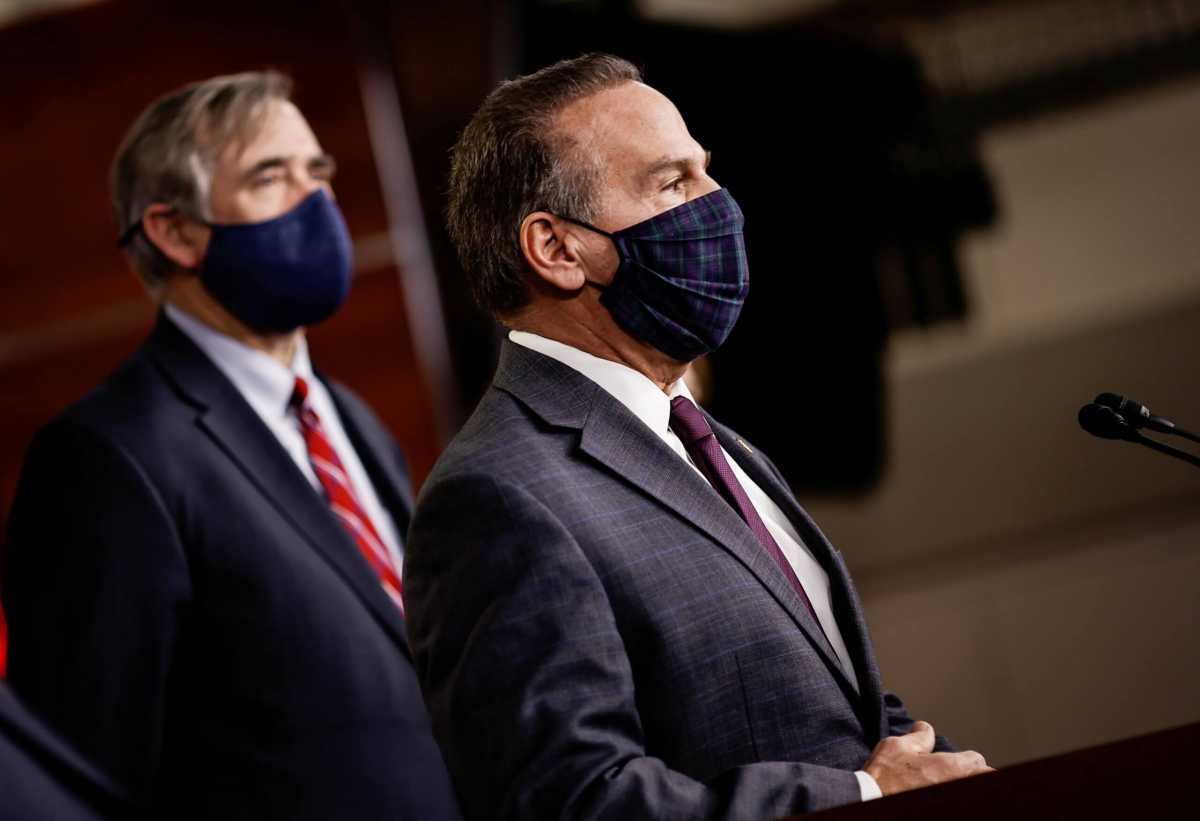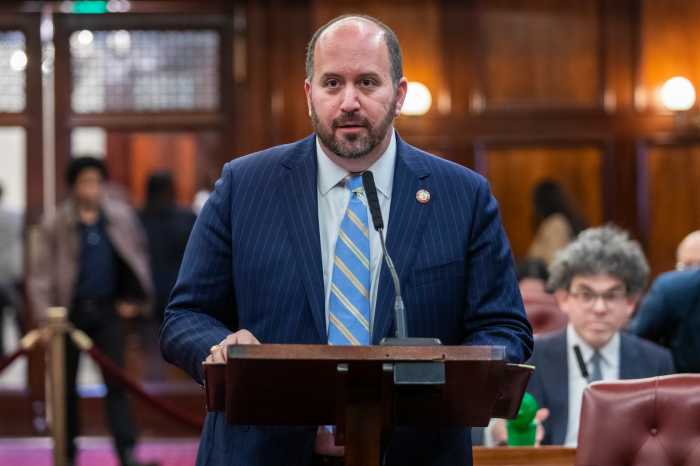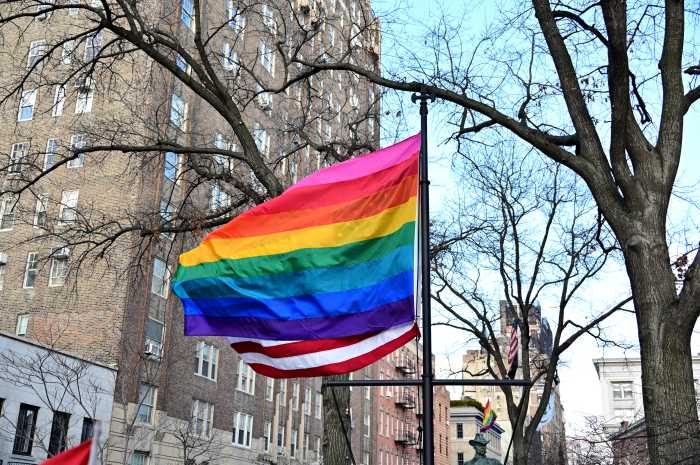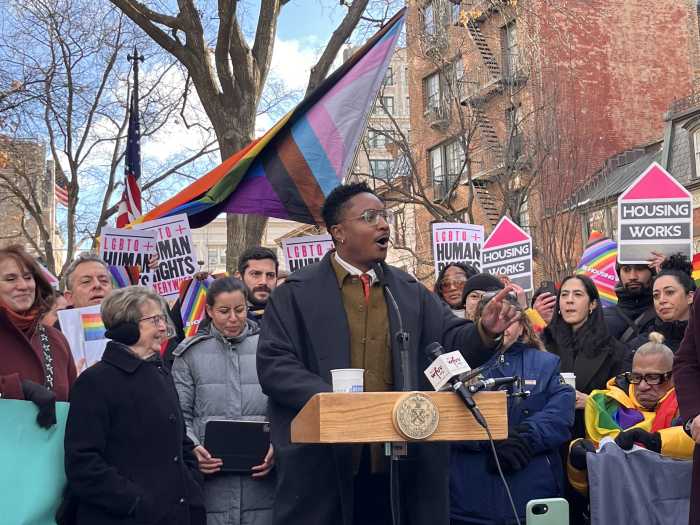The Equality Act, a federal bill that would implement comprehensive protections for the LGBTQ community, passed the House of Representatives as expected on February 25 — but Republicans are preparing to introduce a watered-down alternative bill laced with provisions weakening the scope of protections.
House lawmakers passed the Equality Act by a 224-206 margin, marking the first time the bill passed the lower chamber since 2019. Just three Republicans — Tom Reed of New York’s Ithaca region, John Katko of Syracuse, and Brian Fitzpatrick of Pennsylvania — voted in favor of the bill, which is down from the eight GOP lawmakers who voted for it in 2019.
Out LGBTQ members of the House hailed the bill as a necessary step forward for queer rights, but the victory could be short-lived. The legislation, which would amend Title VII of the 1964 Civil Rights Act to cover protections on the basis of sexual orientation and gender identity, appears destined to falter in the split US Senate, which does not have the 60 votes necessary to pass it. There is also not enough support to overcome the filibuster.
Still, House lawmakers who spoke ahead of the vote seized an opportunity to elaborate on the importance of comprehensive legislation protecting queer Americans.
“To grow up poor, Black, and gay is to not see yourself anywhere,” New York Congressmember Mondaire Jones, who became the first out gay Black member of Congress when he took office earlier this year, said on the House floor February 25. “It is also to feel completely unseen as so many people around invalidate your very existence.”
Bronx Congressmember Ritchie Torres, the first out gay Afro-Latinx congressmember, described the bill as one that boils down to basic equality and fairness under the law.
“We are here to uphold the abiding truth of the American experiment,” Torres said. “That we are all created equal, and that none of us should be evicted, fired or denied accommodations and services simply because of who we are or whom we love.”
Out gay Representative David Cicilline of Rhode Island, the lead sponsor, also spoke up ahead of the vote, saying, “The LGBTQ community has waited long enough. The time has come to extend the blessings of liberty and equality to all Americans, regardless of who they are or who they love.”
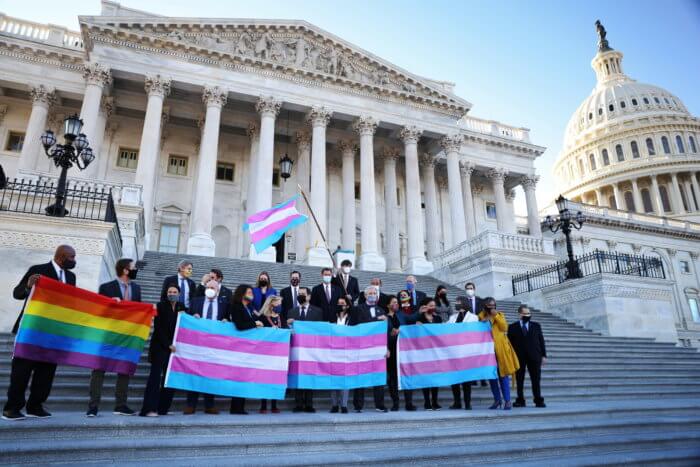
Republicans opposed to the Equality Act have long voiced baseless and transphobic complaints about bathroom access, and the GOP has most recently been fixated on advancing false narratives about transgender athletes and continuing to seek restrictions on healthcare access for transgender individuals. A campaign to ban transgender individuals from girls’ sports and women’s sports has infiltrated State Legislatures across the nation, and in several states there are legislative proposals targeting trans folks in the areas of both healthcare and sports.
However, a key sticking point in the battle over non-discrimination protections pertains to religious carveouts. The alternative bill, dubbed the Fairness for All Act, would similarly implement broad protections across public accommodations, education, housing, and other areas, but it comes with significant caveats, including provisions giving stores with 15 or fewer employees the ability to reject queer patrons, according to the Washington Blade. It is not clear whether that legislative proposal would feature language protecting the rights of individuals to use bathrooms or locker rooms in accordance with their gender identity.
Tyler Deaton, a senior advisor to American Unity Fund and American Unity PAC — which consists of LGBTQ conservatives — told Gay City News that the alternative bill is being proposed in an effort to address concerns about religious freedom and attract enough support from Republicans in the Senate.
“The Equality Act as is cannot get the 10 minimal Republican votes that it has to have to pass, and all we want to do is get this vital legislation to President Biden’s desk and address the genuine concerns from activists across the board that they did not adequately address concerns around religious freedom,” Deaton explained. “It’s not complicated.”
Deaton also believes there is a rather narrow timeframe during which any such legislation would be able to pass both houses and get signed into law.
“This is urgent,” he said. “We have a short window of opportunity. We have a 50-50 tied Senate and the next election could undo that in the Senate or the House. Our window of opportunity could collapse for a decade or more. We need to be moving quickly and aggressively. We need to embrace these Senate Republicans and figure out what they need to get to yes.”
Deaton insists that the Fairness for All legislation would at least bring protections to states lacking comprehensive protections for LGBTQ folks, especially in the south.
However, even if Republicans secure those religious carveouts, it is unclear whether they could even get enough votes to overcome the transphobia that has engulfed many corners of the GOP.
Many others, meanwhile, are remaining firm on the need to pass the Equality Act in its current form. David Johns, the executive director of the National Black Justice Coalition, said the bill’s passage in the House served as a “first step in the next phase toward what we hope will be sweeping civil rights reforms for all of us…” In an interview with Gay City News, Johns emphasized the strong base of public support for the Equality Act and warned against using religion as a license to discriminate.
“The vast majority of Americans support passing of the principles and policy goals included in the Equality Act,” he said. “No American should be able to hide bias and hatred behind the cloak of religion. We have the opportunity now to be honest about our history and in particular the unfair power dynamics that exist between people based on race, patriarchy, sexual identity, and the socially constructed ways we try to separate and oppress people.”
He added, “It is a profitable and political exercise to engage in trying to control the ability of transgender or gender non-conforming people where they can or can’t go.”
While queer Americans wait for Congress to act, President Joe Biden’s early executive orders included directives intended to provide protections for Americans on the basis of sexual orientation and gender identity. The nation is also bracing for a ruling in the case of Fulton v. City of Philadelphia, which hinges on the question of whether Catholic Social Services can use a religious exemption to avoid complying with LGBTQ nondiscrimination requirements pertaining to foster care agencies with city contracts in Philadelphia.
Relatedly, the Supreme Court last July ruled to expand a “ministerial exception” to anti-discrimination laws, which stipulated that folks who teach religion at religious schools can be exempt from non-discrimination laws. Should the Equality Act eventually pass both houses and get signed into law, it would expand on the Supreme Court’s ruling last June in Bostock v. Clayton County, which was based on three cases that pertained to employment discrimination and established that Title VII of the 1964 Civil Rights Act encompasses LGBTQ workers.
As Johns noted, Republicans opposed to the Equality Act are out of step with public opinion across the United States. A poll conducted by the Kaiser Family Foundation following the June Supreme Court ruling last year found that a whopping nine out of 10 adults agreed with the ruling and roughly the same percentage of respondents also agreed that it should be illegal for health care providers to turn away people because of their sexual orientation or gender identity. On a broader level, the poll found that nearly seven in 10 adults favor laws banning discrimination on the basis of sexual orientation and gender identity.
Despite this, Congressional Republicans with large platforms have continued pushing nonsense about transgender individuals. After Democratic Congressmember Marie Newman of Illinois, who has a trans daughter, posted a Trans Flag outside of her office, far-right Republican Congressmember Marjorie Taylor Greene of Georgia posted a sign near her office that reads, “There are TWO genders: MALE & FEMALE. Trust The Science!”
Considering the Equality Act’s dim prospects in the Senate, it remains unclear whether Senate Majority Leader Chuck Schumer intends to bring the bill to the floor for a vote.

